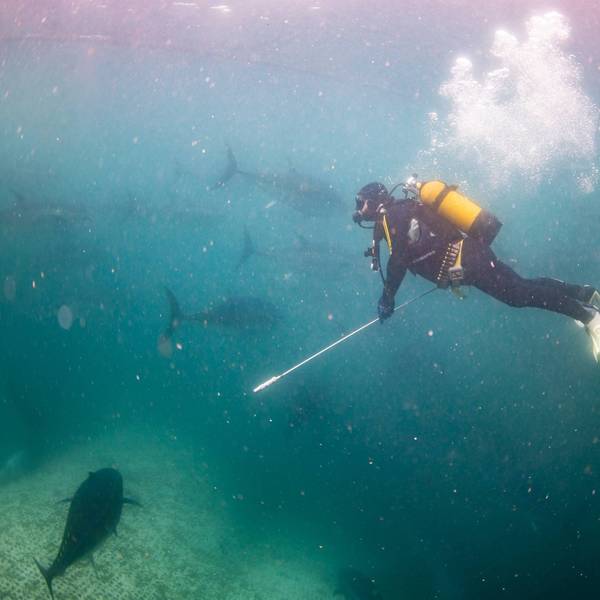Unprecedented Bleaching Event Portends Mass Death of World's Coral Ecosystems
'It's time to shift this conversation to what we can do to conserve these amazing organisms in the face of this unprecedented global bleaching event'
The world's oceans are enduring the longest-lasting and most widespread coral bleaching event ever recorded, according to the National Oceanographic and Atmospheric Administration (NOAA).
And the massive bleaching event is predicted to get even worse--extending into a third, unprecedented year.
The current bleaching event has already all but destroyed Australia's Great Barrier Reef, and NOAA's experts say that warm ocean temperatures will soon trigger bleaching in the northern hemisphere, "including around Hawaii, Micronesia, the Florida Keys and Puerto Rico," the Guardian reports.
Bleaching occurs when overly warm ocean waters cause coral to expel the algae living inside of it, which turns the coral white and erodes its structures, as Common Dreams has reported.
NOAA's Coral Reef Watch has described the growing swaths of bleached and dying coral as "ghostly underwater graveyards."

"It's time to shift this conversation to what we can and are doing to conserve these amazing organisms in the face of this unprecedented global bleaching event," said the director of NOAA's coral reef conservation program, Jennifer Koss, to the Guardian.
"Coral in every major reef region has already experienced severe bleaching," the newspaper adds.
" Climate change has caused global sea surface temperatures to rise by about 1C over the past century, pushing corals closer to their bleaching threshold. A strong El Nino, as well as other weather phenomena, raised the temperature further this year," the Guardian notes.
Extended bleaching events eventually kill a reef--as has already been happening to large stretches of the Great Barrier Reef.
And as with many effects of climate change, the poorest and smallest nations will likely suffer the most from the catastrophic bleaching event. Mark Eakin, director of NOAA's Coral Reef Watch, told the Guardian, "The biggest bleaching threat over the next six months is to the reefs in two U.S. freely associated states: Palau and the Federated States of Micronesia. Islanders there are very dependent on their coral reefs and diving tourism is a major contributor to their economies."
"This event may have major ecological and economic impacts on those islands," Eakin said.
Dead coral reefs "are perhaps the starkest reminders--like the melting Arctic--that a thickening blanket of greenhouse gases is irrevocably changing the face of the Earth," as Inside Climate News recently wrote.
An Urgent Message From Our Co-Founder
Dear Common Dreams reader, The U.S. is on a fast track to authoritarianism like nothing I've ever seen. Meanwhile, corporate news outlets are utterly capitulating to Trump, twisting their coverage to avoid drawing his ire while lining up to stuff cash in his pockets. That's why I believe that Common Dreams is doing the best and most consequential reporting that we've ever done. Our small but mighty team is a progressive reporting powerhouse, covering the news every day that the corporate media never will. Our mission has always been simple: To inform. To inspire. And to ignite change for the common good. Now here's the key piece that I want all our readers to understand: None of this would be possible without your financial support. That's not just some fundraising cliche. It's the absolute and literal truth. We don't accept corporate advertising and never will. We don't have a paywall because we don't think people should be blocked from critical news based on their ability to pay. Everything we do is funded by the donations of readers like you. Will you donate now to help power the nonprofit, independent reporting of Common Dreams? Thank you for being a vital member of our community. Together, we can keep independent journalism alive when it’s needed most. - Craig Brown, Co-founder |
The world's oceans are enduring the longest-lasting and most widespread coral bleaching event ever recorded, according to the National Oceanographic and Atmospheric Administration (NOAA).
And the massive bleaching event is predicted to get even worse--extending into a third, unprecedented year.
The current bleaching event has already all but destroyed Australia's Great Barrier Reef, and NOAA's experts say that warm ocean temperatures will soon trigger bleaching in the northern hemisphere, "including around Hawaii, Micronesia, the Florida Keys and Puerto Rico," the Guardian reports.
Bleaching occurs when overly warm ocean waters cause coral to expel the algae living inside of it, which turns the coral white and erodes its structures, as Common Dreams has reported.
NOAA's Coral Reef Watch has described the growing swaths of bleached and dying coral as "ghostly underwater graveyards."

"It's time to shift this conversation to what we can and are doing to conserve these amazing organisms in the face of this unprecedented global bleaching event," said the director of NOAA's coral reef conservation program, Jennifer Koss, to the Guardian.
"Coral in every major reef region has already experienced severe bleaching," the newspaper adds.
" Climate change has caused global sea surface temperatures to rise by about 1C over the past century, pushing corals closer to their bleaching threshold. A strong El Nino, as well as other weather phenomena, raised the temperature further this year," the Guardian notes.
Extended bleaching events eventually kill a reef--as has already been happening to large stretches of the Great Barrier Reef.
And as with many effects of climate change, the poorest and smallest nations will likely suffer the most from the catastrophic bleaching event. Mark Eakin, director of NOAA's Coral Reef Watch, told the Guardian, "The biggest bleaching threat over the next six months is to the reefs in two U.S. freely associated states: Palau and the Federated States of Micronesia. Islanders there are very dependent on their coral reefs and diving tourism is a major contributor to their economies."
"This event may have major ecological and economic impacts on those islands," Eakin said.
Dead coral reefs "are perhaps the starkest reminders--like the melting Arctic--that a thickening blanket of greenhouse gases is irrevocably changing the face of the Earth," as Inside Climate News recently wrote.
The world's oceans are enduring the longest-lasting and most widespread coral bleaching event ever recorded, according to the National Oceanographic and Atmospheric Administration (NOAA).
And the massive bleaching event is predicted to get even worse--extending into a third, unprecedented year.
The current bleaching event has already all but destroyed Australia's Great Barrier Reef, and NOAA's experts say that warm ocean temperatures will soon trigger bleaching in the northern hemisphere, "including around Hawaii, Micronesia, the Florida Keys and Puerto Rico," the Guardian reports.
Bleaching occurs when overly warm ocean waters cause coral to expel the algae living inside of it, which turns the coral white and erodes its structures, as Common Dreams has reported.
NOAA's Coral Reef Watch has described the growing swaths of bleached and dying coral as "ghostly underwater graveyards."

"It's time to shift this conversation to what we can and are doing to conserve these amazing organisms in the face of this unprecedented global bleaching event," said the director of NOAA's coral reef conservation program, Jennifer Koss, to the Guardian.
"Coral in every major reef region has already experienced severe bleaching," the newspaper adds.
" Climate change has caused global sea surface temperatures to rise by about 1C over the past century, pushing corals closer to their bleaching threshold. A strong El Nino, as well as other weather phenomena, raised the temperature further this year," the Guardian notes.
Extended bleaching events eventually kill a reef--as has already been happening to large stretches of the Great Barrier Reef.
And as with many effects of climate change, the poorest and smallest nations will likely suffer the most from the catastrophic bleaching event. Mark Eakin, director of NOAA's Coral Reef Watch, told the Guardian, "The biggest bleaching threat over the next six months is to the reefs in two U.S. freely associated states: Palau and the Federated States of Micronesia. Islanders there are very dependent on their coral reefs and diving tourism is a major contributor to their economies."
"This event may have major ecological and economic impacts on those islands," Eakin said.
Dead coral reefs "are perhaps the starkest reminders--like the melting Arctic--that a thickening blanket of greenhouse gases is irrevocably changing the face of the Earth," as Inside Climate News recently wrote.


